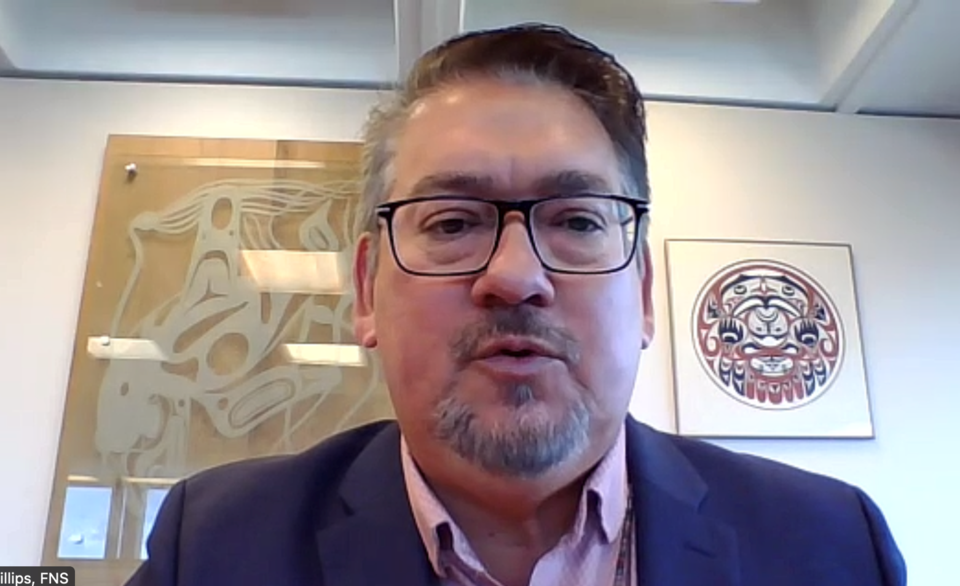Leaders from local governments and First Nations held a joint press conference Thursday to voice their collective opposition to the B.C. government’s Bill 15, which aims to expedite infrastructure products.
The key concern from the First Nations Leadership Council (FNLC) and the Union of BC Municipalities (UBCM) centres on First Nations and local governments being sidestepped in decision-making processes.
“If passed into law, Bill 15 would give greater powers to cabinet to expedite the approval of projects it deems to be ‘provincially significant.’ First Nations and local governments have expressed concern with the lack of consultation prior to the legislation being drafted,” the two entities stated in a joint statement issued via the UBCM.
If passed into law, the bill would give greater powers to cabinet to expedite the approval of projects it deems to be “provincially significant,” the groups stated.
The FNLC said the bill may override the Declaration on the Rights of Indigenous Peoples Act, while local governments said they are concerned about local planning being disrupted.
“The process has been rushed and did not include meaningful consultation with UBCM or local governments,” said UBCM president Trish Mandewo, who is also a City of Coquitlam city councillor.
“The bill can override zoning bylaw amendments and official community plans, raising liability concerns for city halls.”
She said the bill is also part of a trend in decision-making being removed from local communities and centralized in Victoria.
“This bill is eroding public trust. Local governments are willing to remove red tape, but the provincial government needs to be willing … to sit down and work with us moving forward,” said Mandewo.
Grand Chief Stewart Phillip, president of the Union of B.C. Indian Chiefs, said the bill is in direct conflict with the United Nations Declaration on the Rights of Indigenous Peoples.
He said some of the projects scheduled for fast-tracking are “outrageous” and pointed to plans to increase the tailings pond at the Mount Polley mine site near Quesnel, B.C.
Stewart Phillip is married to BC NDP MLA Joan Phillip.
"She is part of government and has responsibilities in that regard … [and] I have my own constituents," said Stewart Phillip.
“We've had interesting discussions in the living room on this one."
He said the "undemocratic" bill needs a "re-do.”
Premier David Eby said the legislation would benefit both Indigenous communities and municipalities.
"Moving faster doesn't have to mean reducing standards," Eby said at a news conference after attending the western premiers conference in Yellowknife.
He added that "it can't happen at the expense of Indigenous rights."
Robert Phillips, political executive member of the First Nations Summit, called the bill an “unfortunate and avoidable” process.
He said the province is not following its own laws and the framework set up with First Nations over the last five to 10 years.
“We have literally spent decades building principled frameworks and processes to lead us to reconciliation and shared prosperity in this province,” said Phillips.
“The most recent is the Declaration on the Rights of Indigenous Peoples Act, passed unanimously by the legislature in 2019, establishing the United Nations Declaration on the Rights of Indigenous Peoples as the framework for reconciliation. Instead of leaning into this framework and related process, the province has decided to ignore it and attempt to empower itself with extraordinary control.”
Meanwhile, on the federal government level, Phillips said he is likewise concerned First Nations will be overlooked on federal government projects.
“We are concerned we are seeing similar legislation in other provinces,” said Terry Teegee, Regional Chief of the B.C. Assembly of First Nations.
The groups noted the bill could be passed as early as May 28, once the legislature returns to sitting on May 26.
Phillips said First Nations will contemplate legal action if the bill passes.
"We are going to see protest, we are going to see courts, we are going to see conflicts," said Phillips.
But he said the groups are not entirely opposed to the intent of the bill to improve economic development in the province.
Government responds to joint statement
B.C. Premier David Eby has previously is a response to the threat of tariffs from the United States under President Donald Trump.
The bill is being proposed via House Leader and Minister of Transportation Mike Farnworth, who declined to speak to BIV.
The ministry provided a statement to BIV, noting "our engagement process during development of the Bill was shorter than we would have liked."
As such, the ministry assured "at every step of the way, we are committed to working collaboratively with partners, and to ensuring projects uphold B.C.’s world-class environmental standards and consultation with First Nations.
As such, "given the enabling nature of the legislation, deeper consultation with First Nations is planned for policy and regulation development."
The ministry noted it is working with the Declaration Act Secretariat at the Ministry of Indigenous Relations and Reconciliation "to ensure we fully engage going forward to develop the policy and regulations to implement this legislation."
This article was updated May 23 with the government's response



